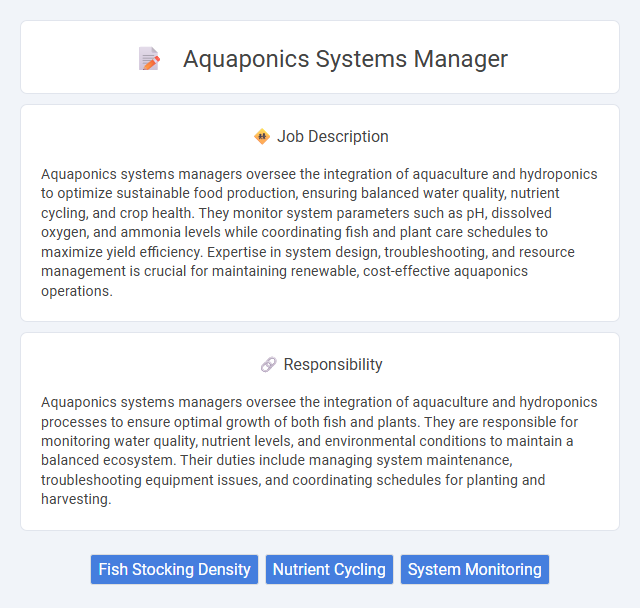
Aquaponics systems managers oversee the integration of aquaculture and hydroponics to optimize sustainable food production, ensuring balanced water quality, nutrient cycling, and crop health. They monitor system parameters such as pH, dissolved oxygen, and ammonia levels while coordinating fish and plant care schedules to maximize yield efficiency. Expertise in system design, troubleshooting, and resource management is crucial for maintaining renewable, cost-effective aquaponics operations.
Individuals with a strong interest in sustainable agriculture and environmental science are likely to be well-suited for an aquaponics systems manager role. Those who possess problem-solving skills and enjoy hands-on technical work may find the job both engaging and fulfilling. Candidates with experience in biology, hydroponics, or aquaculture could have a higher probability of success in managing the delicate balance of fish and plant ecosystems effectively.
Qualification
Aquaponics systems managers require strong expertise in hydroponics, aquaculture, and water quality management, supported by a degree in environmental science, agriculture, or a related field. Proficiency in system design, nutrient cycling, and pest control is critical, alongside experience with IoT monitoring and automated feeding systems. Strong leadership, problem-solving skills, and knowledge of sustainable farming practices ensure efficient operation and yield optimization.
Responsibility
Aquaponics systems managers oversee the integration of aquaculture and hydroponics processes to ensure optimal growth of both fish and plants. They are responsible for monitoring water quality, nutrient levels, and environmental conditions to maintain a balanced ecosystem. Their duties include managing system maintenance, troubleshooting equipment issues, and coordinating schedules for planting and harvesting.
Benefit
Managing an aquaponics system likely offers significant benefits such as enhancing sustainable agriculture by combining aquaculture and hydroponics, which may reduce water usage considerably compared to traditional farming methods. This role potentially promotes efficient resource management and can improve crop yields and fish production simultaneously, leading to increased profitability. Experience in this position might also provide valuable expertise in environmentally friendly practices and innovative food production technologies.
Challenge
Managing aquaponics systems likely involves navigating complex challenges related to balancing fish health and plant growth within a closed ecosystem. The role probably demands continuous monitoring and adjustment of water quality parameters to prevent system imbalances or disease outbreaks. Problem-solving skills and adaptability might be critical for addressing unexpected issues that could impact overall productivity.
Career Advancement
Aquaponics systems managers oversee integrated fish and plant production environments to maximize sustainable yield and operational efficiency. Expertise in water quality control, nutrient cycling, and system troubleshooting positions professionals for leadership roles in agricultural technology firms or environmental consulting. Advancing to senior management or research and development roles often requires continuous learning in biotechnology and sustainable farming innovations.
Key Terms
Fish Stocking Density
Fish stocking density is a critical parameter in aquaponics systems management, directly influencing fish health, growth rates, and water quality. Maintaining optimal densities typically ranges from 20 to 40 kg/m3, balancing biomass production with adequate oxygen levels and waste management to prevent stress and disease. Precise monitoring and adjustment of stocking density enhance nutrient cycling efficiency, supporting both aquaculture and hydroponic crop yield within the integrated system.
Nutrient Cycling
Aquaponics systems managers optimize nutrient cycling by balancing fish waste conversion into bioavailable nutrients for plant growth, ensuring efficient biosystem sustainability. They monitor water quality parameters such as ammonia, nitrite, and nitrate levels to maintain optimal microbial activity and nutrient uptake. Effective management of nutrient cycling enhances crop yield and supports environmental conservation within integrated aquaponics operations.
System Monitoring
Aquaponics systems managers specialize in continuous system monitoring to maintain optimal conditions for plant and fish health, including water quality metrics such as pH, ammonia, nitrate levels, and dissolved oxygen. They utilize sensor technology and data analysis software to detect imbalances, preventing disease outbreaks and ensuring efficient nutrient cycling. Consistent monitoring directly impacts crop yield and aquaculture productivity, making it a critical function in large-scale aquaponic operations.
 kuljobs.com
kuljobs.com